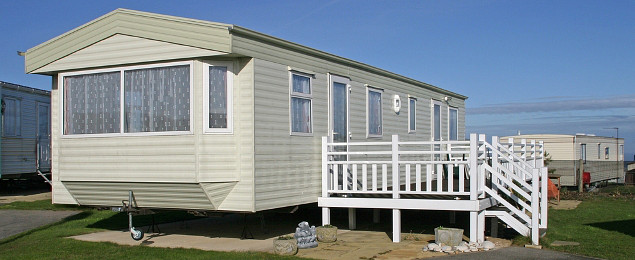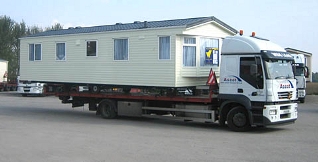3 BD / 1 BH
GA 30331

Find foreclosed homes for sale up to 60% below market value on our foreclosure listings

Mobile homes are also known as factory-built homes or static caravans. They are homes that are constructed in a factory and then delivered to the site, as opposed to traditional homes, which are built on site from the ground up.
Like any other type of home, mobile homes can turn into foreclosed mobile homes if the owner fails to make regular mortgage payments. Mobile home foreclosures typically follow the same procedures as traditional foreclosures.
Prefabricated homes vary based on size and style, but they are typically built in the same fashion. The home is constructed offsite and sits on trailer frames with wheels and a permanent chassis (hence the term ‘mobile’). Tires are used for transportation purposes and can remain on the home, but are usually removed when the home becomes permanent on a site, leaving the trailers or house trailers intact.
Mobile homes come in two general types: single-wide models and double-wide models. Single-wide mobile homes are usually 90 feet long and up to 18 feet wide. Double-wide mobile homes – composed to two homes put together – are anywhere from 20 feet to 32 feet wide, although larger homes can exist (these are usually called triple-wides).
In any given market, there are usually single-wide and double-wide foreclosure mobile homes for sale. A single-wide foreclosure mobile home is naturally cheaper than a double-wide foreclosure, all other things considered equal.

A mobile home is typically transported with a tractor-trailer, or a semi-truck. A single-wide can be transported in one piece; a double-wide is transported in two sections and assembled on site. Single-wide trailers can be moved via private vehicle – typically a big pickup truck – but it isn’t recommended due to the strain the weight of the home can put on a vehicle. Anything smaller than a large pickup truck probably will not have enough power to safely move a trailer.
For this reason, you usually see foreclosed mobile homes in the back of a tractor-trailer when they are being relocated from one site to the next.
With some exceptions, foreclosed mobile homes follow the same processes and investing principles as traditional homes. The fact that they can be moved makes foreclosed mobile homes for sale can actually make these mobile foreclosures a better investment for certain areas of the country (like rural counties).
One big draw of mobile foreclosed homes is their price. With few exceptions, a mobile foreclosure is cheap; even at full market value; these homes are often sold at a discount compared to the price of a traditional home. When you factor in foreclosure discounts, the price disparity is even greater. You can save money when you buy these foreclosed homes and take advantage of larger profit margins for flipping.
These properties can theoretically be purchased in bulk, depending on how many are owned by one lender. In most cases, though, they are sold on an individual basis.
Many investors obtain mobile homes in a foreclosure sale for resale purposes, but many also turn them into rental units for lease. The second option is very popular because those who desire or need to live in a mobile home typically prefer to rent rather than pursue home buying. This is particularly true for markets with strong temporary housing needs, like areas with demand for vacation homes or cheap houses for college students.
Financing mobile homes can be accomplished via the same mortgage companies and banks that provide lending for a site-built home (with some exceptions; some banks, for insurance reasons, do not finance mobile home loans). There are companies that specialize in mobile home loans.
Traditionally, in most markets, mobile homes are financed at a higher interest rate because of higher risk. Severe weather and fire, for example, can be far more destructive to a mobile home than a traditional one. Plus, many mobile homes are not placed on land that is owned by the owner, which plays a big role in successful financing. Homes on land owned by the homeowner are more likely to be treated like traditional mortgages.
Mobile foreclosed homes are just as likely to occur as traditional foreclosures for several reasons. Interest rates can be higher, for one; additionally, those who live in mobile homes typically have smaller and/or tighter budgets than those who purchase site-built homes. This means a foreclosure mobile homes sale is as likely to occur as a pre-existing home sale.
Mobile homes, travel trailers, and modular homes are different structures, although each has similarities. A mobile home is constructed off site in a factory, just like modular homes. Both are transported to a site for installation. Modular homes lose their mobility when they are delivered to the site, whereas mobile homes can be moved more readily.
Legally, mobile homes and modular homes are becoming more differentiated. Mobile homes fall under federal regulations, while modular homes fall under local regulations. Modular homes are typically treated more favorably, in a way, by lending companies and insurers.
Travel trailers and mobile homes used to be synonymous decades ago, but are now viewed as separate. A travel trailer is almost always smaller than a full-size mobile home and is used for temporary housing or vacation travel.
Mobile homes can be attached to the ground and usually are. When these homes are delivered to the site, they are placed on the ground and wheels are usually removed. A foundation may have been constructed to support the home, ranging from a steel structure to a more basic cinder-block setting. The home is then anchored to the ground to give the structure more stability during inclement weather. Water, gas, and sewer hookups are installed. Finally, the base of a mobile home is covered with paneling from the bottom of the home to the ground to cover up the chassis and framework beneath the house for better aesthetics.
Mobile foreclosures may come with all of the hookups and structure frames that were installed. Those moving these after successfully submitting an offer should take care to thoroughly remove each hookup connection before relocating the property.
Mobile homes are regulated at the federal level by the Department of Housing and Urban Development (HUD). This is partially due to greater need for safety regulations (owing to the materials used in construction and a general lower degree of stability and integrity than a site-built home); it is also due to the fact that mobile homes can be sold and delivered across state lines due to their mobile nature.
One thing to consider when buying a mobile foreclosed home on a local level is wind standards. Mobile homes must be able to withstand wind ata certain strength. Foreclosed mobile homes in NC, for example, have to withstand winds up to 100 miles per hour in the coastal part of the state. In the southern tip of Florida, the requirement is 110 miles per hour. If a foreclosed home isn’t rated for a particular zone, it cannot legally be installed in a zone with a higher rating requirement.
Mobile homes can be on individual plots of land, especially in rural areas, but in most cases, they are found in mobile home communities. These manufactured home communities are also known as mobile home parks or trailer parks, and range from a handful of homes to hundreds in one location. Typically, home owners will lease a plot of land from the park owner, complete with utilities. It is possible, though, for a home owner to also own the land outright, even within a community. This is important to note in some cases when purchasing a foreclosure mobile home.
